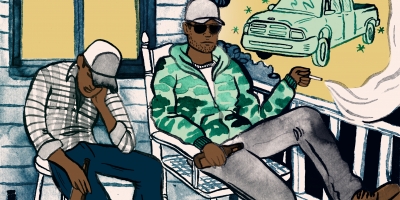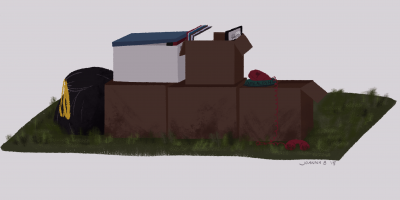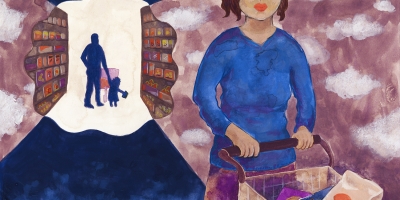Fiction
The Story of Our Life & The Way They Did
by Lauren Becker

The Story of Our Life
Gray skies on Saturday mean bed and bad television. Junk food and thin, watery naps. I could hit rewind on the DVR, but it’s not worth it. When the junk food runs out, I realize I am out of food entirely. I am frantic, especially today. I put on clothes, brush my teeth, and clean up yesterday’s makeup a little. I decide my hair is a lost cause, and go to the grocery store.
I put cans of soup; frozen diet meals; eggs; hot sauce; diet soda; a couple of Boston cream donuts; four artificially flavored, individually wrapped lemon pies; and a large bag of kettle chips in my cart. I decide to get some English muffins because I like how the butter melts into the empty spaces. I don’t bother to arrange my groceries to hide the junk.
There is a lanky man with unruly dark hair in the bread aisle. I startle when he smiles at me, but remember to smile back. I forget the muffins and imagine a life with him. Of dinners and movies and hikes in the beginning. Then of long mornings in bed and brunch at trendy restaurants, where our perfectly mussed hair will give us away. The story changes when I see a little girl clinging to his leg. She looks about four and she is beautiful and she does not look like him and I know there is a beautiful wife and mother waiting at home for bread and milk and baby shampoo.
He says hi and I say hi and he tells me his name and I tell him mine. The little girl says her name is Cristina and she will be five next week. Her dad says, “Tell her what Daddy is giving you for your birthday present, Teeny.”
“Daddy is letting me get my ears pierced and I’m getting gold hearts in my ears and I’m never gonna take them out. But that’s just my big present, and I’ll get other presents, too, if I’m good.”
“I got my ears pierced when I was five, too,” I lie. I think five is too young. I had to wait until I was ten. It doesn’t matter. She didn’t mention Mommy, who is dead or out of the picture. I run my hands through my hair.
Cristina looks in my cart. “Can we get donuts, too, Daddy? Please?” I put my hands on my cart handle to escape before I die of mortification.
“Not this time, sweetie, but go ahead and pick out some goldfish.” The crackers are only a few feet away. The little girl studies them, tracing a goldfish on one bag with her pointer finger. He smiles at me again. He will ask for my phone number now.
He steps away. “It was nice meeting you. Maybe we’ll see you here again.”
“Yes.”
“Teeny, pick your crackers and let’s go.”
She runs to him and holds up a bag. “I want these ones, Daddy.”
“Okay, love. Put them in the cart and say bye to the nice lady.”
She glances at me, still focused on her crackers. “Bye.” She takes his hand. “Daddy, can I have some in the car?”
They start walking toward the register. I hear him say “Just a few, Teeny. It’s almost time for dinner.”
I pick up the bag with her goldfish finger tracings and put it in my cart. I leave the donuts in the empty space.

The Way They Did
Arna danced the way she did when everyone danced the way she did. When they drank too much and dropped acid and were fascinated by the movement of their limbs. They grew older and tired. Arna danced for them all.
She never had a real job and made this hers. She was off the drugs, but she drank and danced for a living, her real living financed for nearly fifty years now by Arnold Heyden of Heyden Labs, of Heyden, California. Arnold Heyden of boatloads of money, liquor bottles of money, rehabs of money. The money made him a father. It made Arna a Heyden.
She was at Kerry’s nearly every night and some days. She liked the jukebox and cheap drinks. She didn’t have a drink of choice. She told the bartender to surprise her. His name was Pete. She called him Bart, telling him nearly every night it was short for bartender. She didn’t know she had stopped being pretty. Her father told her she was pretty. Her father gave her money. He was always right.
Shelly and I went in a couple times a week. Pete gave us free drinks. Shelly gave him peeks down her shirt. Sometimes more. I bartended during his breaks and talked to Arna. She called me Bart. It didn’t matter who poured the drink, as long as the drink was a surprise.
She sang along with Carole King, with Joni Mitchell, with James Taylor. She had a table that was hers, dollars and quarters enough to make the jukebox hers. If someone else got to it before she could reload her favorites, she had Pete cut it off. He got a two-hundred-dollar tip every night. He listened to Carole King sing, “It’s too late” and made Arna interesting new drinks he found in the exotic bartending guide he bought with tip money. Camel’s milk, bacon, chocolate bars. He would have done it without the tips. He looked out for me and Shelly, too.
One night, as she sang about fire and rain, holding the jukebox for necessity and comfort, a man came in and walked directly to her, pulling her by the elbow to an almost-standing position. When she recognized her father, she looked scared, like a little girl in trouble. He scooped up Arna’s dollars and quarters and led her from the bar. He did not speak. He did not pay for her drinks or leave a tip.
Arna was back the next night, stocked with quarters and dollars. She asked for a scotch, neat. Pete gave her a Macallan 12, the best he had. She tossed it back, wincing slightly, and ordered another. Pete, Shelly, and I looked at each other, concerned. She didn’t notice me and Shelly most of the time, but now she gave us dirty looks, turned her attention back to Pete, and said “Keep ’em coming, Bart.”
That night, the jukebox played mostly Frank Sinatra. Arna did not sing. An hour before last call, she finished her scotch, put two hundred dollars in cash on the bar, then counted out another four hundred dollars, placed it next to the other bills, and walked out, steadier than I had ever seen her.
We didn’t see her for almost seven months. Shelly and Pete stopped going out back and started going to dinner and antique fairs. The decrease in tip money didn’t make much of a difference to Pete when Shelley moved in and paid half the rent.
I took over some of Pete’s afternoon shifts. Only a few drunks came in early. They paid with dollar bills and change. I played whatever I wanted on the jukebox.
The day Arna came back, she dumped her dollars and change on her table, put on some Carole King, stepped to the bar, and said, “Rehab was a bitch, Bart. Make me something special.”
I poured her a Macallan 12. She smiled.
“What’s your name, Bart?”
“It’s Meg. But you can call me Bart.”
She pushed the scotch away.
“Surprise me, Meg.”




